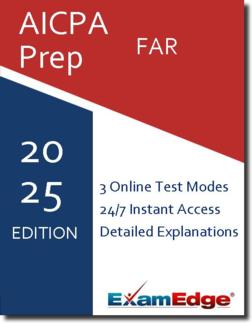AICPA FAR (FAR) Practice Tests & Test Prep by Exam Edge - Blogs
Based on 28 Reviews
- Real Exam Simulation: Timed questions and matching content build comfort for your AICPA FAR test day.
- Instant, 24/7 Access: Web-based AICPA Financial Accounting and Reporting practice exams with no software needed.
- Clear Explanations: Step-by-step answers and explanations for your AICPA exam to strengthen understanding.
- Boosted Confidence: Reduces anxiety and improves test-taking skills to ace your AICPA Financial Accounting and Reporting (FAR).



